Sleep-inducing aromatherapy tea blends combine calming herbs and botanicals to promote relaxation and improve sleep quality. You'll find expert-approved recipes featuring essential ingredients like chamomile, lavender, valerian root, passionflower, and lemon balm. These teas harness nature's power to trigger relaxation responses in your brain. To craft the perfect blend, aim for a ratio of 40-50% chamomile as a base, 30-40% sleep herbs, and 10-20% soothing spices. Brew your tea using fresh, cold water heated to just below boiling, and consume it 30-60 minutes before bedtime. By incorporating these aromatic blends into your nightly routine, you'll discover a natural path to better sleep.
Understanding Sleep-Inducing Aromatherapy Teas
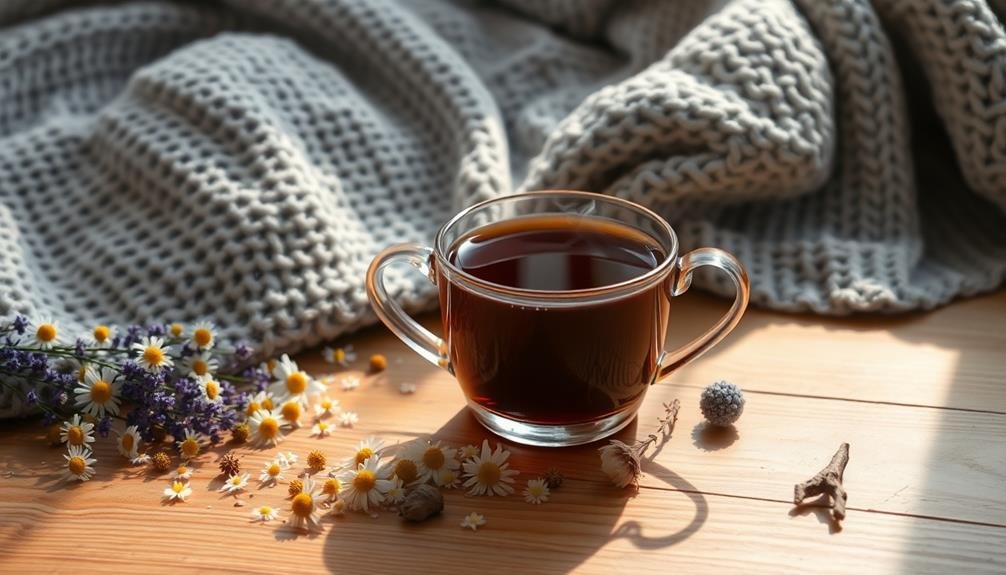
Tranquility awaits in a cup of sleep-inducing aromatherapy tea. These specialized blends combine herbs and botanicals known for their calming properties and sleep-promoting effects. When you sip these teas, you're not just enjoying a warm beverage; you're harnessing the power of nature to help you relax and drift off to sleep.
Sleep-inducing aromatherapy teas often contain ingredients like chamomile, lavender, valerian root, passionflower, and lemon balm. Each of these herbs has unique properties that can help calm your mind, reduce anxiety, and prepare your body for rest.
The aroma of these teas also plays a vital role in their effectiveness, as certain scents can trigger relaxation responses in your brain.
To get the most out of your sleep-inducing tea, brew it properly and drink it about an hour before bedtime. This allows time for the active compounds to take effect.
Essential Herbs for Sleep Blends
Now that you understand the basics of sleep-inducing aromatherapy teas, let's explore the key herbs that make these blends effective.
These herbs have been used for centuries to promote relaxation and improve sleep quality. When combined, they create a powerful synergy that can help you drift off to dreamland more easily.
Here are five essential herbs for sleep-inducing tea blends:
- Chamomile: Known for its calming properties, it reduces anxiety and promotes relaxation.
- Lavender: Its soothing scent helps lower heart rate and blood pressure, preparing your body for sleep.
- Valerian root: A natural sedative that can improve sleep quality and reduce the time it takes to fall asleep.
- Passionflower: Helps alleviate insomnia and anxiety by increasing GABA levels in the brain.
- Lemon balm: Reduces stress and anxiety while promoting a sense of calm.
When selecting herbs for your sleep blend, choose organic options whenever possible to avoid pesticides and other harmful chemicals.
You can experiment with different combinations of these herbs to find the perfect blend that works for you.
Remember to start with small amounts and adjust as needed to achieve the desired effect.
Calming Floral Ingredients
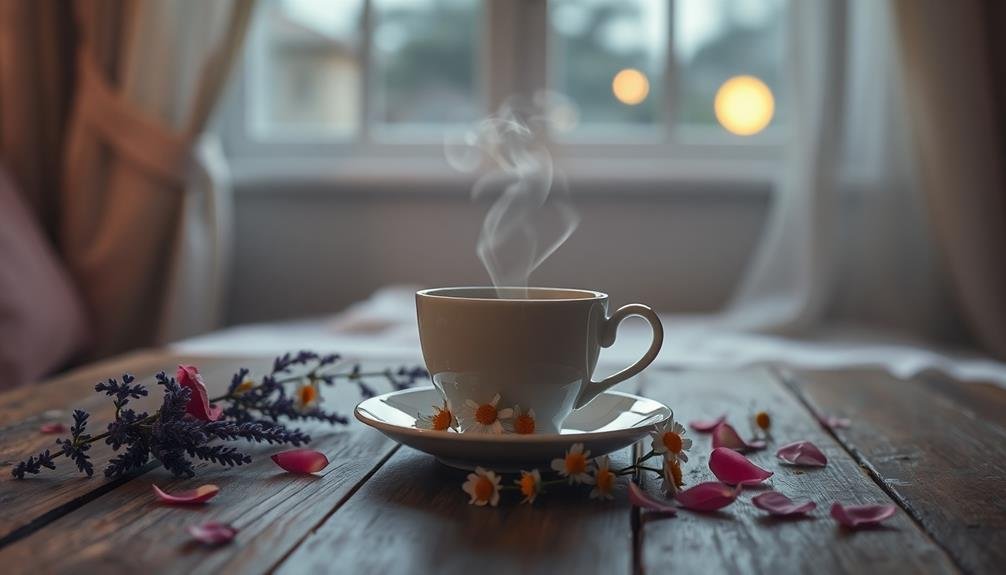
Floral ingredients play a crucial role in creating soothing aromatherapy tea blends for sleep. You'll find that these delicate, fragrant additions can greatly enhance the calming properties of your nighttime brew.
Lavender, known for its relaxing scent, is a popular choice that can help reduce anxiety and promote better sleep quality. When you're looking for a milder floral note, consider chamomile. This gentle flower has been used for centuries to induce relaxation and ease insomnia.
Don't overlook the power of rose petals in your sleep blend. They're not just pretty; rose petals can help alleviate stress and create a sense of emotional well-being.
For a unique twist, try incorporating linden flowers. They're less common but equally effective in promoting restfulness. Passionflower is another excellent option, known for its ability to calm racing thoughts and reduce nervous tension.
When selecting floral ingredients, opt for organic, food-grade varieties to guarantee safety and purity. Remember, a little goes a long way with these potent florals. Start with small amounts and adjust to your taste preferences and desired strength of aromatherapy effects.
Soothing Spices for Nighttime Teas
Spice blends can transform your nighttime tea into a sleep-inducing elixir. When combined with the floral ingredients mentioned earlier, these soothing spices enhance your tea's relaxation properties and create a comforting aroma that'll lull you into a peaceful slumber.
Consider adding these spices to your nighttime tea blend:
- Cinnamon: Known for its warm, sweet flavor and ability to regulate blood sugar
- Nutmeg: Contains compounds that may help reduce insomnia and anxiety
- Cardamom: Offers a calming effect and aids in digestion
- Ginger: Promotes relaxation and eases digestive discomfort
- Turmeric: Contains curcumin, which may improve sleep quality
When selecting spices for your sleep-inducing tea, opt for organic, high-quality varieties to guarantee maximum potency and flavor. Start with small amounts and adjust to taste, as some spices can be quite strong. You'll want to strike a balance between the spices and other ingredients in your blend.
To maximize the benefits of these soothing spices, steep your tea for at least 5-7 minutes. This allows ample time for the spices to release their essential oils and beneficial compounds into your brew, creating a truly effective sleep-inducing aromatherapy experience.
Crafting the Perfect Tea Ratio
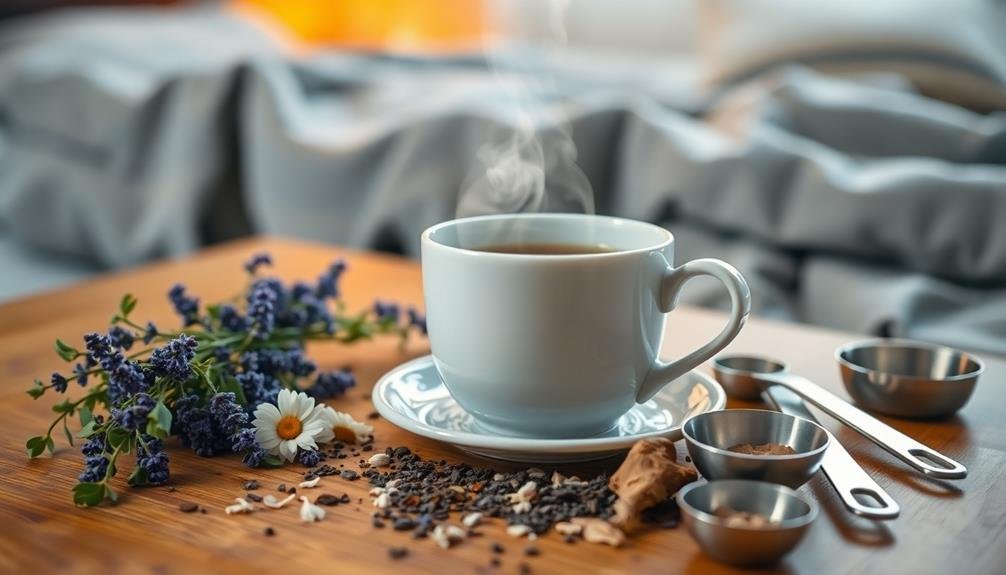
Creating the ideal sleep-inducing tea blend requires a delicate balance of ingredients. You'll want to take into account the potency of each herb and spice to guarantee a harmonious and effective mixture. Start with a base of chamomile, which should make up about 40-50% of your blend. This gentle, floral herb sets the foundation for relaxation.
Next, add your chosen sleep-promoting herbs, such as valerian root, passionflower, or lemon balm. These should comprise 30-40% of the blend. Finally, incorporate your soothing spices and flavor enhancers, like lavender, cinnamon, or orange peel, making up the remaining 10-20%.
Here's a quick reference guide for crafting your perfect tea ratio:
| Component | Percentage | Examples |
|---|---|---|
| Base | 40-50% | Chamomile |
| Sleep Herbs | 30-40% | Valerian, Passionflower |
| Spices | 10-20% | Lavender, Cinnamon |
Expert-Recommended Sleep Tea Recipes
You'll find several expert-recommended sleep tea recipes to help you unwind and prepare for a restful night.
These blends include the soothing Lavender-Chamomile Nighttime Infusion, the potent Valerian Root Sleep Elixir, and the calming Passionflower-Lemon Balm Blend.
Each recipe offers unique benefits and flavors to suit your personal preferences and sleep needs.
Lavender-Chamomile Nighttime Infusion
This expert-recommended lavender-chamomile nighttime infusion combines two of the most potent sleep-inducing herbs.
You'll find that this soothing blend helps calm your mind and relax your body, preparing you for a restful night's sleep. To make this infusion, you'll need dried lavender buds and chamomile flowers, easily found in health food stores or online.
To brew your nighttime tea:
- Use 1 teaspoon of dried lavender buds and 1 teaspoon of chamomile flowers per cup of water
- Heat water to just below boiling (around 200°F)
- Steep the herbs for 5-7 minutes
- Strain and sweeten with honey if desired
- Sip slowly 30-60 minutes before bedtime
You can enhance the sleep-inducing properties of this infusion by adding a few drops of lavender essential oil to your pillow or using a diffuser in your bedroom.
The combination of aromatic tea and lavender scent creates a powerful sleep-promoting environment. For best results, make this tea part of your nightly routine, signaling to your body that it's time to wind down and prepare for sleep.
Valerian Root Sleep Elixir
While lavender and chamomile offer gentle sleep support, valerian root packs a stronger punch for those needing more potent sleep assistance. This powerful herb has been used for centuries to promote relaxation and improve sleep quality. To create a valerian root sleep elixir, you'll need to steep 1 teaspoon of dried valerian root in hot water for 10-15 minutes. Add a touch of honey to balance the earthy flavor.
For best results, drink this tea 30-60 minutes before bedtime. Be aware that valerian root can interact with certain medications, so consult your healthcare provider before use. Here's a quick guide to help you understand the effects and benefits of valerian root tea:
| Benefit | Onset | Duration |
|---|---|---|
| Reduced anxiety | 30-60 min | 2-4 hours |
| Improved sleep quality | 1-2 hours | 6-8 hours |
| Decreased insomnia | 1-2 weeks | Long-term |
| Enhanced relaxation | 30-60 min | 2-4 hours |
| Lowered stress levels | 1-2 hours | 4-6 hours |
Passionflower-Lemon Balm Blend
Sleep enthusiasts seeking a gentle yet effective bedtime blend should consider the passionflower-lemon balm combination. This expertly crafted tea recipe combines two powerful herbs known for their calming properties.
Passionflower helps reduce anxiety and promote relaxation, while lemon balm soothes the nervous system and eases stress.
To create this soothing blend, you'll need:
- 1 teaspoon dried passionflower
- 1 teaspoon dried lemon balm
- 1 cup of hot water
- Honey or stevia (optional)
- A tea infuser or strainer
Simply mix the herbs in your infuser, steep in hot water for 5-7 minutes, and enjoy. For best results, drink this tea 30-60 minutes before bedtime.
The mild, slightly floral taste is pleasant on its own, but you can add a touch of honey or stevia if desired.
Regular consumption of this blend may improve your sleep quality and help you fall asleep faster.
It's crucial to acknowledge that while these herbs are generally safe, you should consult your healthcare provider before adding any new herbal remedies to your routine, especially if you're pregnant, nursing, or taking medications.
Brewing Techniques for Optimal Results
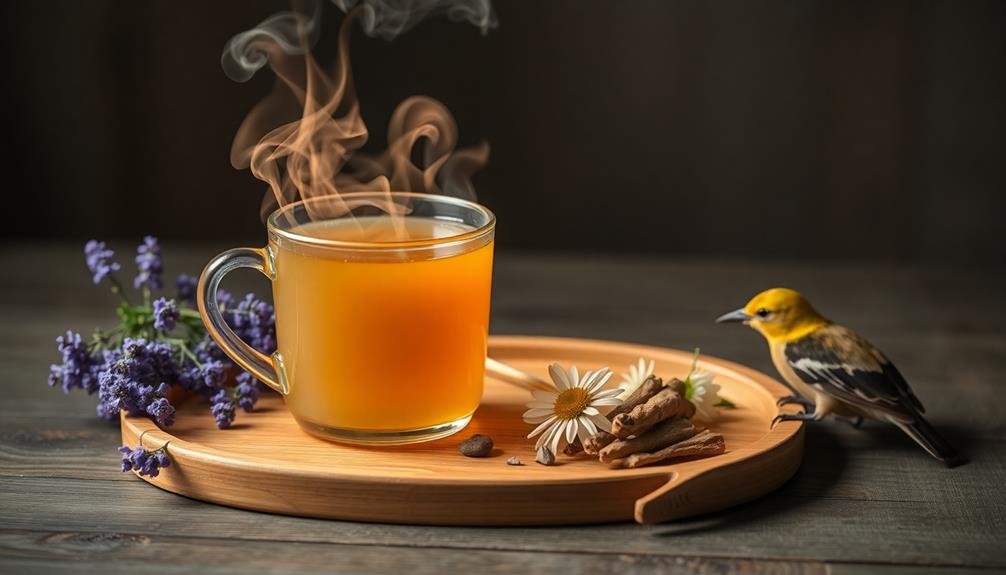
To achieve the full sleep-inducing benefits of your aromatherapy tea blend, proper brewing techniques are essential. Start by using fresh, cold water and bring it to just below boiling point (around 200°F or 93°C). This temperature helps preserve the delicate flavors and aromatic compounds of the herbs.
Measure out 1-2 teaspoons of your herbal blend per cup of water, adjusting to your taste preference. Place the herbs in a tea infuser or filter bag, then pour the hot water over them. Cover the cup or teapot to trap the aromatic steam, which enhances the tea's therapeutic properties.
Allow the tea to steep for 5-10 minutes, depending on the herbs used and desired strength. Longer steeping times may extract more beneficial compounds but can also lead to a stronger, potentially bitter taste. Once steeped, remove the herbs and inhale the steam deeply before sipping.
For a stronger aromatherapy effect, consider preparing a larger batch and adding it to a warm bath before bedtime. The combination of aromatic steam and skin absorption can amplify the tea's sleep-inducing properties, creating a relaxing pre-sleep ritual.
Timing Your Aromatherapy Tea Consumption
Now that you've mastered the brewing techniques, let's focus on when to drink your sleep-inducing aromatherapy tea. Timing is essential for maximizing the tea's effectiveness in promoting better sleep. Aim to consume your blend about 30 to 60 minutes before your intended bedtime. This allows enough time for the herbs to work their magic without interrupting your sleep with late-night bathroom trips.
Consider integrating your aromatherapy tea into your nightly wind-down routine. Here are some tips to enhance its effectiveness:
- Avoid caffeine after 2 PM to prevent interference with your sleep-inducing blend.
- Turn off electronic devices at least an hour before bed.
- Dim the lights in your living space to signal your body it's time to rest.
- Pair your tea with a relaxing activity like reading or gentle stretching.
- Sip your tea slowly, savoring its aroma and flavors.
Enhancing Tea Blends With Essential Oils
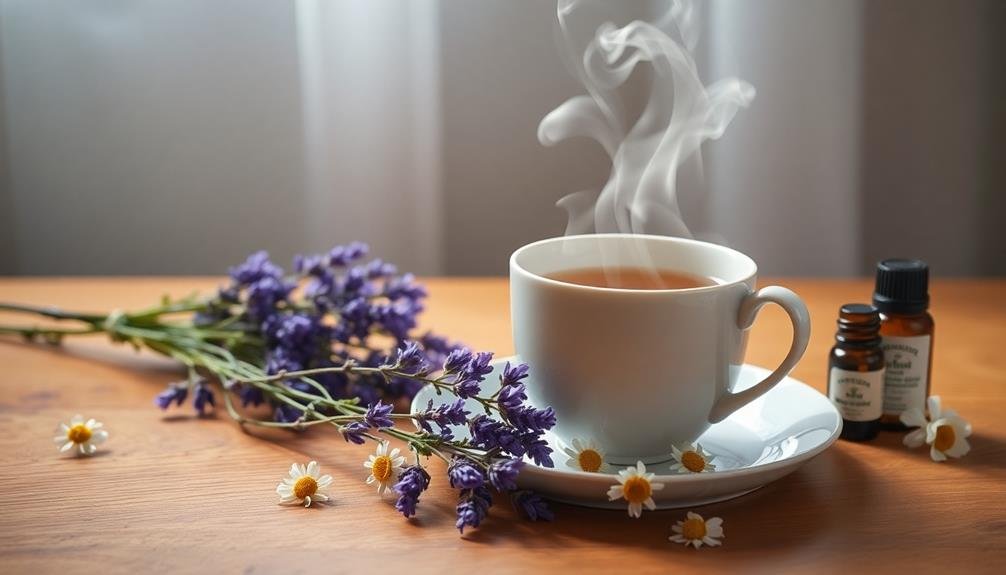
To enhance your sleep-inducing tea blend with essential oils, you'll need to select oils that complement your tea's flavor and aroma profile.
You must learn proper oil dilution techniques to guarantee the safety and effectiveness of your blend.
It's vital to take into account safety precautions when working with essential oils, as some may cause adverse reactions or interfere with medications.
Selecting Compatible Essential Oils
When selecting essential oils to enhance your sleep-inducing tea blend, it's crucial to choose scents that complement the tea's flavors while promoting relaxation. Consider oils known for their calming properties, such as lavender, chamomile, and bergamot. These oils not only add depth to your tea's aroma but also contribute to its sleep-inducing effects.
To guarantee compatibility, start by identifying the primary flavors in your tea base. For example, if you're using a chamomile tea, look for oils that enhance its floral notes. Bergamot can add a citrusy twist, while vanilla can provide a comforting sweetness.
Remember to use food-grade essential oils and add them sparingly, as their potency can quickly overpower the tea's natural flavors.
When choosing essential oils for your sleep-inducing tea blend, keep these factors in mind:
- Aroma profile: Select oils with complementary scents
- Therapeutic properties: Focus on oils known for relaxation and sleep promotion
- Safety: Use only food-grade, high-quality essential oils
- Dosage: Start with small amounts and adjust to taste
- Personal preferences: Consider your individual scent and flavor preferences
Proper Oil Dilution Techniques
Safety is paramount when enhancing tea blends with essential oils. You'll need to properly dilute these potent substances to avoid potential health risks. Start by selecting a carrier oil, such as fractionated coconut oil or sweet almond oil, which will help disperse the essential oils evenly throughout your tea blend.
For a general guideline, use a 2% dilution rate, which translates to about 12 drops of essential oil per ounce (30 ml) of carrier oil. However, for sleep-inducing blends, you might want to use a lower concentration of around 1% (6 drops per ounce) to prevent overstimulation.
When measuring, use droppers or pipettes for accuracy. Mix your essential oils with the carrier oil in a separate container before adding to your tea blend. This guarantees even distribution and prevents direct contact with undiluted oils.
Remember that some essential oils are more potent than others. Adjust your dilution ratio accordingly, especially for stronger oils like clove or cinnamon. Always err on the side of caution and start with a lower concentration, gradually increasing if needed.
Safety Considerations
Essential oils, while beneficial for sleep-inducing tea blends, require careful handling to guarantee your safety. When incorporating these potent extracts into your tea, always prioritize caution and follow proper guidelines.
Remember that essential oils are highly concentrated substances, and even small amounts can have significant effects on your body. Before using any essential oil in your tea blend, research its potential interactions with medications you're taking and any health conditions you may have.
It's vital to use food-grade essential oils specifically intended for internal consumption. Never substitute aromatherapy-grade oils, as they may contain harmful additives.
Here are key safety considerations to keep in mind:
- Always dilute essential oils properly before adding them to your tea
- Start with minimal amounts and gradually increase if needed
- Avoid using essential oils if you're pregnant or nursing without consulting a healthcare professional
- Keep essential oils out of reach of children and pets
- Don't exceed recommended dosages, as overuse can lead to adverse effects
Storing Your Sleep Tea Blends
Proper storage of your sleep tea blends is essential for maintaining their potency and flavor. To preserve your blends, keep them in airtight containers made of glass, ceramic, or metal. Avoid plastic containers, as they can absorb essential oils and compromise the tea's quality.
Store your blends in a cool, dark place away from direct sunlight, heat, and moisture. A pantry or kitchen cabinet is ideal.
Label each container with the blend's name and date of creation. This practice helps you track freshness and rotate your stock. Most herbal tea blends remain potent for 6-12 months when stored correctly. However, some ingredients may lose their efficacy faster than others.
To maintain peak freshness, only mix small batches of your sleep tea blends at a time. This approach guarantees you're always using the most potent ingredients.
When handling your blends, use clean, dry utensils to prevent introducing moisture or contaminants. If you notice any changes in color, aroma, or taste, it's best to discard the blend and create a fresh batch.
Potential Side Effects and Precautions
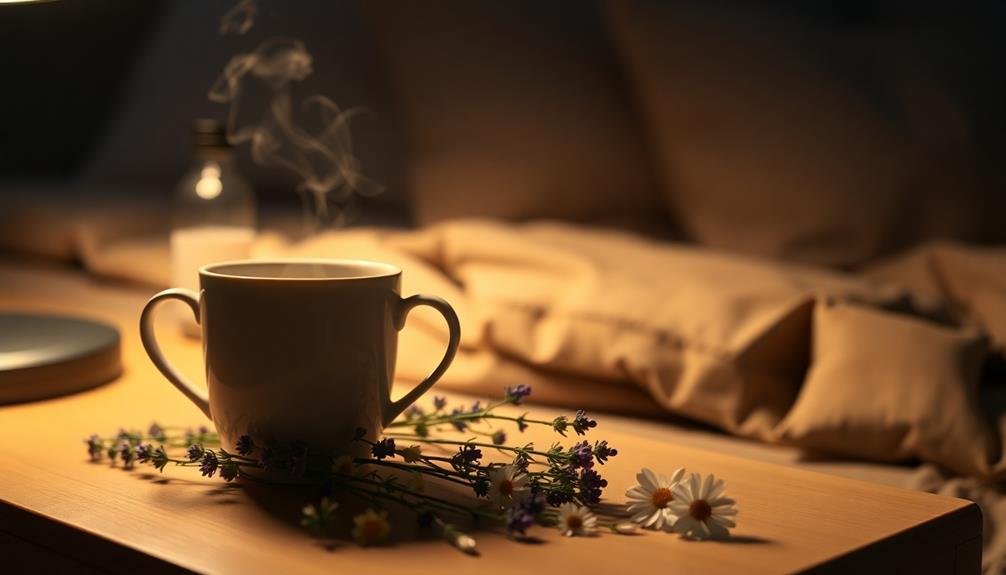
While aromatherapy tea blends can promote better sleep, it's important to be aware of potential risks.
You should consider possible allergic reactions to certain herbs, interactions with medications you're taking, and safety concerns if you're pregnant or breastfeeding.
Always consult your healthcare provider before incorporating new herbal teas into your routine, especially if you have existing health conditions or are on medication.
Allergic Reactions
Allergic reactions pose a potential risk when using aromatherapy tea blends for sleep. While rare, these reactions can range from mild discomfort to severe health issues. It's essential to be aware of your own allergies and sensitivities before incorporating new herbs or essential oils into your routine.
To minimize the risk of allergic reactions, consider the following precautions:
- Always perform a patch test before using a new blend
- Start with small amounts and gradually increase usage
- Be cautious if you have known allergies to plants or flowers
- Consult with a healthcare professional if you're pregnant or nursing
- Discontinue use immediately if you experience any adverse reactions
If you're prone to allergies, pay close attention to common allergens in sleep-inducing blends, such as chamomile, lavender, and valerian root. These ingredients, while generally safe, can trigger reactions in some individuals.
Watch for symptoms like skin rashes, itching, swelling, or difficulty breathing. If you experience any of these signs, stop using the blend and seek medical attention if necessary.
Interactions With Medications
Interactions between sleep-inducing aromatherapy tea blends and medications can lead to unexpected side effects or reduced efficacy of either the blend or the prescribed drugs.
It's essential to consult your healthcare provider before incorporating any new herbal tea into your routine, especially if you're taking medications.
Certain herbs commonly used in sleep-inducing blends, such as valerian root and chamomile, may interact with sedatives, anticoagulants, or antidepressants.
For instance, valerian can enhance the effects of sedatives, potentially causing excessive drowsiness. Chamomile might increase the risk of bleeding when combined with blood thinners.
Be cautious if you're taking medications for anxiety, depression, or insomnia, as some herbs can intensify or counteract their effects.
St. John's Wort, sometimes used in relaxation blends, is known to interact with numerous medications, including birth control pills and antidepressants.
If you're on any prescription medications, always inform your doctor about your use of herbal teas.
They can advise you on potential interactions and help you adjust your medication schedule if necessary.
Pregnancy and Breastfeeding Concerns
Expectant mothers and nursing women should exercise caution when evaluating sleep-inducing aromatherapy tea blends. While many herbal ingredients are generally safe, some can pose risks during pregnancy and breastfeeding. It's essential to consult your healthcare provider before incorporating any new herbal teas into your routine.
Some herbs commonly used in sleep-inducing blends may not be suitable for pregnant or breastfeeding women. Here are key points to reflect on:
- Chamomile: Generally safe, but may increase the risk of miscarriage in large amounts
- Valerian root: Not recommended due to lack of safety data during pregnancy
- Lavender: Generally safe, but may affect hormone levels
- Passionflower: Avoid during pregnancy due to potential uterine-stimulating effects
- Lemon balm: Generally safe, but consult your doctor before use
Even if a tea blend is deemed safe, it's wise to limit your intake.
Remember that caffeine-free doesn't always mean risk-free for expecting or nursing mothers. Always err on the side of caution and prioritize your and your baby's health.
If you're unsure about a specific ingredient, it's best to avoid it until you've discussed it with your healthcare provider.
Combining Teas With Sleep Rituals
Rituals play a powerful role in preparing your mind and body for sleep. Combining your aromatherapy tea blend with a consistent bedtime routine can greatly enhance its effectiveness.
Start by setting a specific time to enjoy your tea each night, ideally 30-60 minutes before bed. Create a calming environment by dimming lights and reducing screen time.
As you sip your tea, engage in relaxing activities like reading, gentle stretching, or meditation. The act of slowly drinking a warm beverage can itself be meditative. Pay attention to the aroma and flavor of your tea, allowing it to ground you in the present moment.
Consider incorporating other sensory elements, such as soft music or nature sounds, to complement the tea's soothing effects.
After finishing your tea, continue your wind-down routine. This might include a warm bath, light journaling, or practicing gratitude.
Customizing Blends for Individual Needs
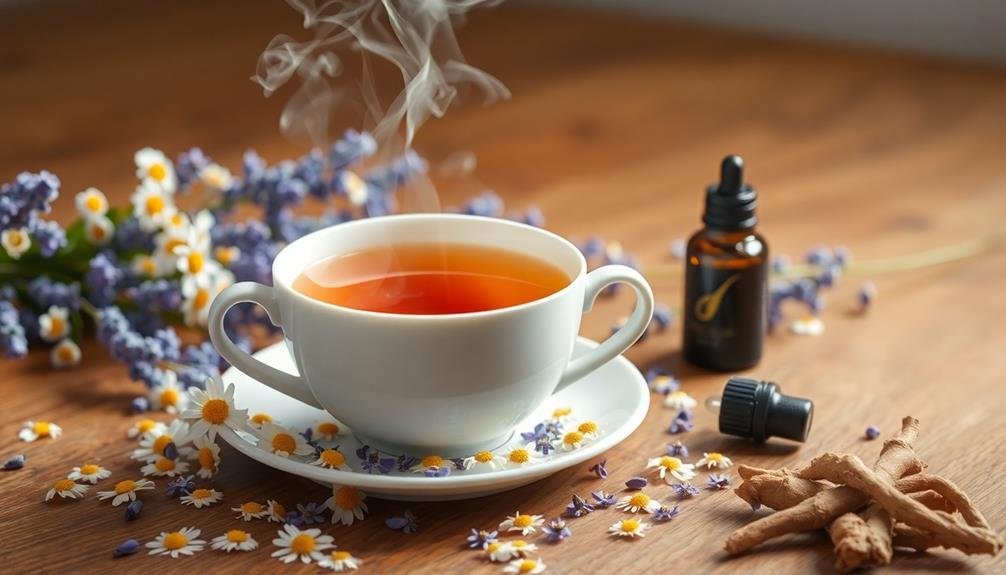
Every individual's sleep needs and preferences are unique. When customizing your aromatherapy tea blend, consider your specific requirements and sensitivities. Start by identifying your sleep issues, such as difficulty falling asleep or staying asleep. Then, select herbs and ingredients that target those concerns.
Experiment with different combinations and ratios to find what works best for you. Don't be afraid to adjust your blend over time as your needs change. Keep a sleep journal to track the effectiveness of different blends and make informed adjustments.
Consider these factors when customizing your sleep-inducing tea blend:
- Your sensitivity to caffeine and other stimulants
- Any allergies or sensitivities to specific herbs
- Your preference for taste and aroma
- The time of day you'll be drinking the tea
- Any medications you're taking that might interact with certain herbs
Remember to consult with a healthcare professional or herbalist if you have any underlying health conditions or are taking medications. They can help you create a safe and effective blend tailored to your individual needs, ensuring you get the most restful sleep possible.
Frequently Asked Questions
Can Sleep-Inducing Teas Interact With Prescription Medications?
Yes, sleep-inducing teas can interact with prescription medications. You should always consult your doctor before combining them. Some herbs in these teas might affect your medication's effectiveness or cause unwanted side effects. It's better to be safe.
Are Aromatherapy Teas Safe for Pregnant or Breastfeeding Women?
You should be cautious with aromatherapy teas during pregnancy or breastfeeding. Some herbs can affect hormones or cross into breast milk. It's best to consult your doctor before using any herbal teas in these situations.
How Long Does It Take for Sleep-Inducing Teas to Show Effects?
You'll typically feel the effects of sleep-inducing teas within 30-60 minutes after drinking. However, it can vary based on your body's metabolism and sensitivity. For best results, try drinking your tea about an hour before bedtime.
Can Children Safely Consume Sleep-Inducing Aromatherapy Teas?
You shouldn't give sleep-inducing teas to children without consulting a pediatrician first. Many herbs can be too strong for kids. Instead, focus on establishing a consistent bedtime routine and creating a relaxing environment for your child's sleep.
Are There Any Caffeine-Free Alternatives for Nighttime Tea Blends?
You'll find plenty of caffeine-free options for nighttime tea blends. Try herbal teas like chamomile, valerian root, or lavender. Rooibos and honeybush are also great alternatives. These soothing choices can help you unwind without the caffeine jitters.
In Summary
You've now got the tools to create your own sleep-inducing aromatherapy tea blends. Remember to experiment with different combinations, but always prioritize safety. Don't hesitate to consult a healthcare professional if you're unsure about any ingredients. As you craft your perfect nighttime brew, you'll discover a natural, soothing way to improve your sleep quality. Sweet dreams await as you sip your way to a restful night's slumber.

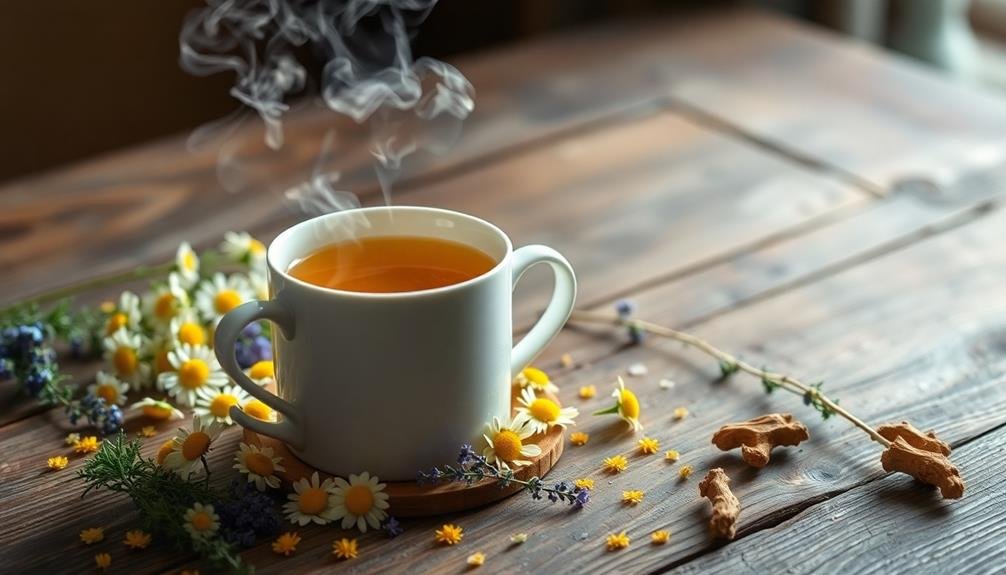



Leave a Reply